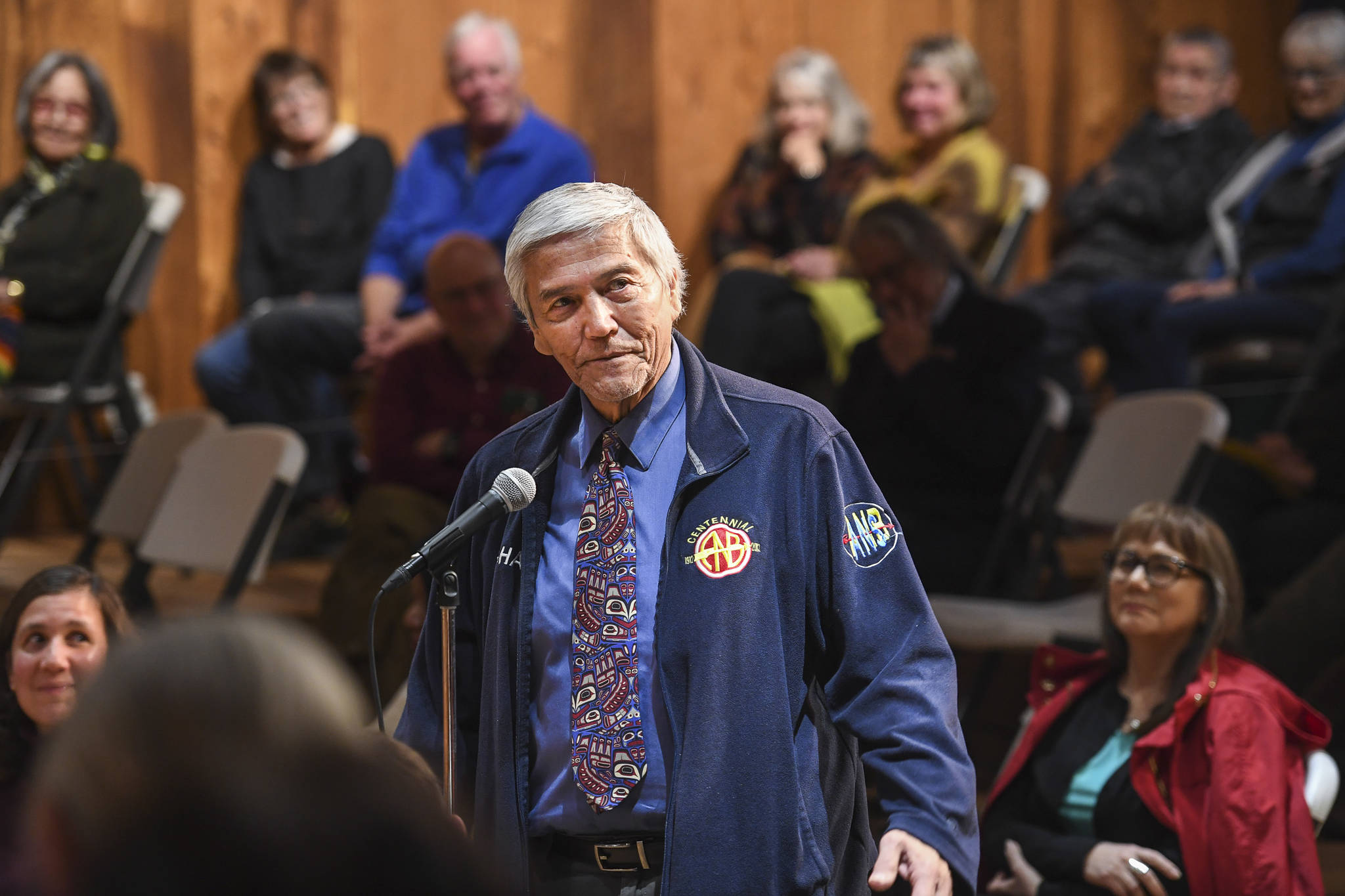Walter Soboleff wasn’t just a Tlingit scholar, religious leader, Alaska Native civil rights advocate and namesake for a state holiday.
Soboleff, who passed away in 2011 at 102, was a friend and relative, who many still remember fondly. Some of those recollections were shared Thursday in the Sealaska Heritage Institute building named for Soboleff to mark Walter Soboleff Day, which was established by state law in 2014.
“I want to bring my uncle alive to you today,” said Albert Kookesh, who is a former state senator in addition to being a relative of Soboleff.
In recognition of the day, Kookesh wore a bolo tie that was given to him by Soboleff on the day that Kookesh was sworn in as a senator. The tie was made by Nathan Jackson out of silver and baleen. The front of the silver tie depicts a raven, and the back of the tie is dated with the year 1969.
“I’m very careful with it because it’s a treasure,” Kookesh said after his shared memories, which are part of a November lecture series being held be SHI. “The giving is more valuable than this.” He gestured toward the silver clasp.
During his talk, Kookesh shared stories that highlighted Soboleff’s philosophy, humor and resolute goodness in the face of less than ideal situations.
[Walter Soboleff: A retrospective]
One story Kookesh told that demonstrated Soboleff’s personality, was his reaction to finding out a man would not rent to him upon realizing that Soboleff was Alaska Native.
The would-be landlord previously told Soboleff that he could rent an apartment through an exchange of letters. Kookesh said in light of Soboleff’s last name and his recent graduation from University of Dubuque in Iowa, the landlord had not realized Soboleff was Tlingit. So upon, meeting Soboleff and his wife, Genevieve, the man rescinded the offer.
“He (Soboleff) said, ‘I’m sorry to have troubled you,” Kookesh said.
He marveled at the magnanimity.
Another example Kookesh shared was a trip Soboleff took during his college days. Kookesh said Soboleff’s parents would always provide him with a steamship ticket to travel from Seattle to Southeast Alaska to come home from Iowa, but Soboleff would have to find his way to Seattle.
One year, because of a lack of funds that meant “riding the rails” to Seattle. During a stop, Soboleff and a classmate planned to canvass homes for food. The friend would ask for sandwich materials, and Soboleff was to ask for bread.
However, Soboleff couldn’t bring himself to knock on a door and ask for bread, Kookesh said, so Soboleff used the meager funds in his pocket to purchase bread.
“He never told his friend,” Kookesh said.
SHI President Dr. Rosita Worl, who called Soboleff a mentor, said she is not much of a praying person but does ask for more of that nature.
“Every morning, I do pray and say, ‘Help me be like Dr. Soboleff,’” Worl said.
Lillian Petershoare, who shared memories during the event, said Soboleff told her he would write his negative thoughts down on a piece of paper, crumple up the paper and throw them away.
“Here’s a man who has inspired all of us by being generous at times a person could be angry,” Petershoare said.
That’s not to say Soboleff was a total stoic, according to the people who knew him well.
Kookesh said he had a quick wit and playful sense of humor.
One exchange he recalled, involved a group of men talking about classical music.
One man said he had always wondered about the meaning of Mozart’s Funeral Dirge, and he intended to ask the composer about it when he got to heaven.
Another man, whom Kookesh said was known to be a smart mouth, asked him what he would if the composer wasn’t there?
“Walter, without skipping a beat, said, ‘Then, you ask him,” Kookesh said.
The recounted retort drew big laughs from those in attendance.
Kookesh said Soboleff once caught his sons, Walter Jr., Sasha and Ross, sneaking back into the house after a night out. Soboleff helped them in through the window, and then did not speak to them about it for three days, Kookesh said. The idea was anticipation of punishment would be worse than any actual discipline meted out.
[Soboleff sons and daughter remember their father on his day]
Walter Soboleff Jr. and Sasha Soboleff were both in attendance to hear the story — Ross Soboleff died on 2018.
“I admit nothing,” Walter Soboleff Jr. said.
Both present sons also shared memories of their father.
“When he left us, I inherited his suits,” Walter Soboleff Jr. said with a flourish that drew laughs. “The guy had taste.”
Sasha Soboleff said his father’s iconic status means there’s always a need to be on his best behavior — even at a Washington airport.
“You never know when someone might say, ‘I have a story about your dad,’” Soboleff said.
There are a lot of them to tell in part because of a prolific letter-writing practice that Kookesh said he considers Soboleff’s ultimate legacy.
“He wrote to people in prison,” Kookesh said. “He wrote to people who had just got promoted. He wrote to people that just got a job. He wrote to people that were struggling. He wrote to people that were succeeding. He wrote to people that were just helping. That’s a legacy. It’s not what he did. It’s what he was.”
• Contact reporter Ben Hohenstatt at (907)523-2243 or bhohenstatt@juneauempire.com. Follow him on Twitter at @BenHohenstatt.

